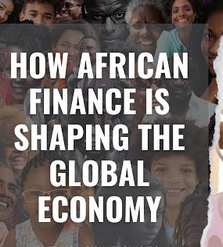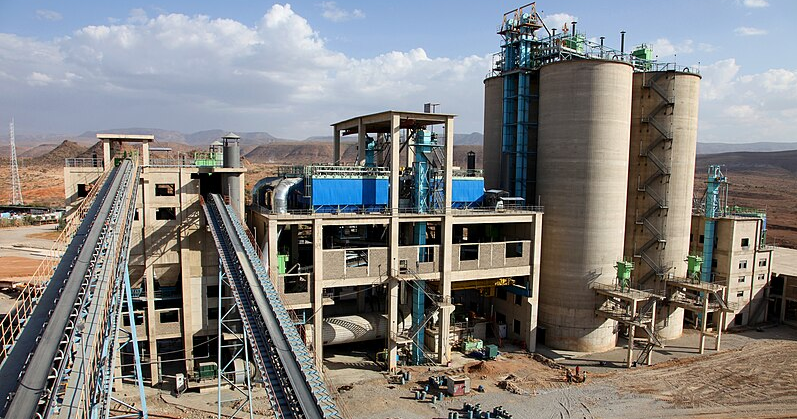By Dr. Brooks Robinson\Black Economics
Photos: YouTube Screenshots\Wikimedia Commons
It is common knowledge that today’s global economic strategic game is characterized by the Global North generally exploiting economically the Global South. The Global North thrives via its highly valued advanced technological economies, which are often made possible—in part—by low-valued primary factors of production from the Global South. This is particularly true for African nations’ participation in the global economic strategic game. This outcome is “common knowledge” in the sense that the topic is discussed summarily as just described ad nauseum. However, seldom are there discussions concerning how the Global North plans perpetually to sustain this exploitation.

Again, it is common knowledge that the exploitation is egregious for African nations even when they participate in commodity cartels. Conceptually and theoretically, economic cartels are expected to provide their members with expanded market power. However, even commodity cartels offer little additional leverage to African nations over international commodity prices, and they typically have a limited capacity to bring their commodities to international markets. Given their current economic conditions and the expectations of their citizens, many African nations are at the mercy of nations that have significantly more economic power in the global economic strategic game.
Despite this enduring saga of exploitation, most African nations exhibit a persistent willingness to engage as willingly exploited economic agents in the rigged and unfair global economic strategic game. The rationale for this posture, of course, is “convergence.” That is, certain African nations expect that future conditions will evolve so that their economies will grow rapidly enough to overtake economies in the Global North in relative size and quality. Historical evidence abounds that such an outcome is possible: viz., South Korea, Singapore, Hong Kong, Taiwan, China, India, etc. All these economies have achieved high-levels of development, sophistication, and maturity over the past 60 years—if not completely, then certainly on a widespread basis. But Africa is not Asia, and Africa is
now said to be experiencing neo-colonialism.
A relevant question that should be posed by African nations and Black Americans, who seek to invest in or return to the African continent, is not only whether convergence is a valid theoretical construct, but whether prospects for widespread convergence in a reasonable period is already precluded?
What do we mean by “precluded?”
First consider that planet Earth does not embody an unlimited supply of important minerals (e.g., gold, silver, copper, nickel, iron ore, uranium, magnesium, bauxite, cobalt, Rare Earth elements, etc.) that are required for a favorable level of material economic development as characterized by the existing Global North.[1] And, yes, there may be future innovation in producing artificially or otherwise substitutes for some of these important minerals, and there are likely to be improvements in recycling existing minerals. Also, a high level of material economic development could be
redefined.
Second, it will be possible to bring to market currently existing supplies of these important minerals only on an increasing cost basis. Consequently, Global South nations may find it increasingly unprofitable in the short run to consume the important minerals that they produce; i.e., it may only be profitable for them to export these minerals.
Third, the future demand for minerals and other resources may exceed available supply. Specifically, continued and persistent demand for these minerals is expected from the Global North. In addition, Global South nations seeking to converge with the Global North will require minerals to produce relatively identical physical replicas of Global North economies. Hence, total demand for mineral and other resources may exceed the global availability at prices that are within the reach of the Global South.
If the foregoing conditions prevail, then realistic prospects for Global South convergence with the Global North is precluded: It will not and cannot occur unless the material world is transformed, today’s knowledge of physical sciences are superseded, and/or economic convergence is achievable through some other currently unknown route, structure, or form.
![]()
An important question for the Global South and North is: How will economic agents revise their strategic play when they realize that convergence is not on the cards? Logically, the Global South could withdraw from the global economic strategic game. Such a response should motivate the Global North to seek to impose its will on the Global South. However, history includes a story of a
European Global North’s defeat at the hand of an African and Middle Eastern Global South (i.e., the Crusades).
But there are new elements to a potential near-term Global South-North clash. Today, the Global North includes a mainly European-derivative component, but also a new Global North member that does not now align perfectly with its European-derivate counterparts; i.e., BRICS nations. On the other hand, the Global South includes Africa and the Middle East, the African and Middle East Diaspora, and certain South and Southeast Asian nations that may or may not align closely with the new Global North member (BRICS).
Operationalizing play in this strategic game is somewhat complicated, and ultimate outcomes are not easily predictable. The European-derivate North is a known quantity, but to what extent can it convince the BRICS to fully enter its circle in opposition to the Global South? Also, to what extent can the BRICS sweep the South and Southeast Asian South under its wings for protection and use? But the real concern for the Global South is not whether African and Middle Eastern nations can withstand the European-derivative North and BRICS nations and their closely linked Global South
members. Rather, the concern is about the Global South’ ability to convince the African and Middle Eastern Diaspora to serve as an important strategic player in struggles to retain valued and valuable mineral resources, to extract deserved Reparations for their historical economic exploitation, and/or to impose pain broadly on its opposition.
Remember that the African and Middle Eastern Diaspora is pocketed everywhere: North America, South America, the Caribbean, Europe, Australia, New Zealand, and certain parts of Asia. To what extent can this African and Middle Eastern Diaspora forge sufficient racial/ethnic unity and use it to reinforce and augment the African and Middle Eastern Global South position?
The strategic position of the African and Middle Eastern Diaspora all over the world could present a formidable force against the Global North’s European-derivative and BRICS hosts. It is difficult to concentrate on defeating an exterior foe when there are internal challengers—irrespective of how small or formidable they are. An internal foe
is pure vulnerability.
It seems that the European-derivative and BRICS Global North was not a supremely wise long-term economic strategist—a fact to which it is now awakening. It not only exploited the Global South’s valuable mineral resources, but it also sought to benefit from its supply of human capital. The latter is a Trojan Horse filled with the Global South’s African and Middle Eastern Diaspora.
Consequently, the ultimate outcome of Global North and South economic strategic plays in response to the convergence fallacy revelation hinges on many factors, none more important than how the African and Middle Eastern Global South and its worldwide Diaspora interpret the deceit of all elements of the Global North. If the Global South exhibits intense displeasure with the long-contrived deceit, then that anger, if channeled wisely and strategically, might be sufficient to turn the table on the Global North and precipitate a new world order.

Dr. Brooks Robinson is the founder of the Black Economics.org website.
References:
[1 ] Our non-exhaustive research reveals that there is no publicly available and unified global data source on the total known reserves of minerals and other important nonproduced resources that are used for economic production and development. In addition, we were able to identify only one analysis that considers current reserves and potential demand in a medium-term context (out to 2050). [See Jane Hammarstrom, et al., (2021), Assessment of Undiscovered Copper Resources of the World, 2015, U.S. Department of the Interior, U.S. Geological Survey, Reston, Virginia. The analysis is for copper and indicates that there should be a sufficient global supply of copper up to at least 2050. However, it is well known that the supply of certain important minerals will be inadequate in the medium term. Hence, this essay that considers what may transpire when there is inadequate supply. The upshot is that a thorough analysis is direly needed to confirm which important minerals reflect adequate versus inadequate supplies over the long term.








